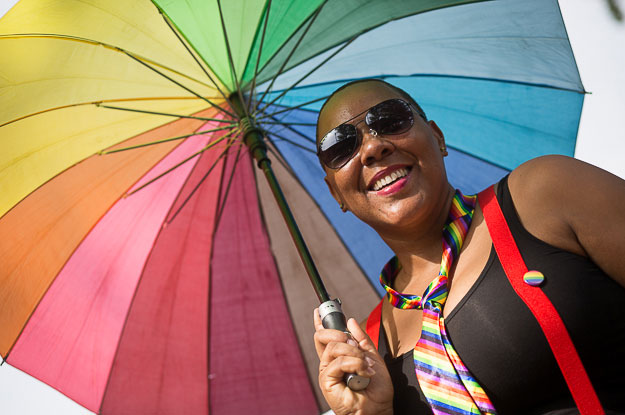The Dominican Republic’s lesbian, gay, bisexual, and transgender (LGBT) community was shaken after the nightclub shooting in Orlando a month ago. At least four victims were from that small country, and the attack underscored the discrimination many LGBT activists feel in their own, largely conservative society. In a particularly ill-timed display of opposition to LGBT equality, hundreds marched in the capital of Santo Domingo against same-sex marriage on the day after the attack.
But a community of LGBT activists has been emboldened in recent years.
Deivis Ventura, an activist who in May ran to become his country’s first openly gay congressman and provide a voice for LGBT people in Dominican politics, told AQ that LGBT Dominicans don’t have much in the way of government support. “The government stays silent on our issues, which is very dangerous,” he said.
Earlier this month, Ventura and other organizers sensed anxiety among members of their community in the run up to Santo Domingo’s 9th annual LGBT Pride march on July 3. “There was a lot of fear after what happened in Orlando, and we saw a lot of hate comments toward the community on social media,” Cristian Ramírez, a volunteer coordinator for the LGBT advocacy group Amigos Siempre Amigos, told AQ.
But participants rose above the fear, and Ventura estimated that upwards of 10,000 people attended this year’s march – a far cry from the five cars that made up the event nine years ago, and symbolic of the progress the LGBT community has made in their country.
Ventura’s candidacy, and that of another openly gay man in a local race, was unsuccessful, but was historic and significant for LGBT visibility in the country.
Contributing to activists’ momentum has been James “Wally” Brewster, Jr., the U.S. ambassador to the Dominican Republic and an openly gay man who has been instrumental in spurring conversations over the treatment and acceptance of LGBT Dominicans. Brewster participated in the pride march this month alongside his husband and fellow ambassadors from seven other countries, including Mexico, Germany and Canada.
Brewster’s ability to rise above harsh discrimination directed at him after his appointment by President Barack Obama in 2013 provided a crucial support to the LGBT rights movement. When the then-archbishop of Santo Domingo, Cardinal Nicolás de Jesús López Rodríguez, warned that Brewster would “suffer” if he came and waged a public war of words against him, Brewster didn’t go anywhere, and instead made LGBT rights a pillar of his agenda as ambassador. Advising activists and helping launch the country’s first LGBT Chamber of Commerce are just some of the examples of his efforts.
“Having the ambassador’s support has made a 1,000 percent difference,” Xavier Páez Soto, a software engineer from Santo Domingo, told AQ. “I think the LGBT community has a stronger voice now. There are both positive and negative discussions in the country about LGBT people and rights, and that’s cool, because I prefer people speaking instead of not saying anything at all.”
Ramírez, meanwhile, points to the many areas where work needs to be done, such as police harassment of gays and a campaign to pass a gender identity law and educate the public on the challenges faced by transgender people. He says the ambassador’s support has been important in moving these issues forward.
“That our issues are being discussed in the halls of power has helped us,” Ramírez told AQ. “The ambassador’s support for our activities and his moral support are highly appreciated, since it feels like we’re not alone, us ordinary people on the side who don’t have power and are doing things for the community.”
In addition to Brewster’s issue-forward diplomacy, there are other positive signs for LGBT Dominicans. Soto points to Jackeline Montero, a former sex worker and women’s advocate who was recently elected to Congress.
“She could be a new voice for women and the LGBT community in the Dominican Republic,” Soto said. A sign of progress indeed.
—
O’Boyle is an editor for AQ






